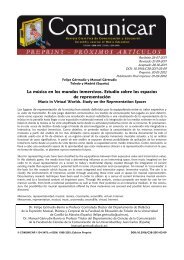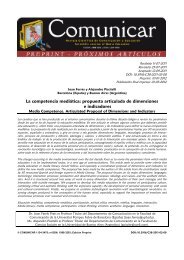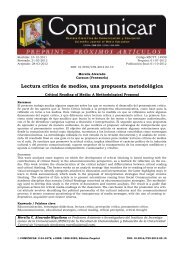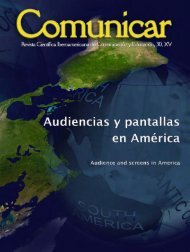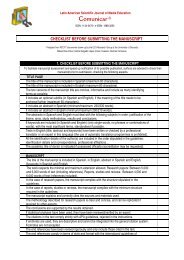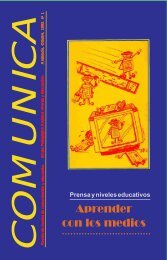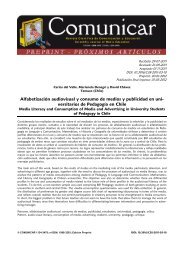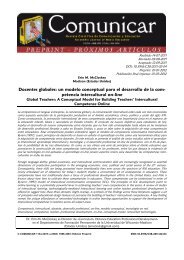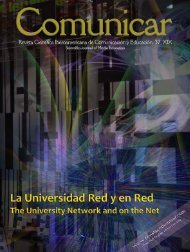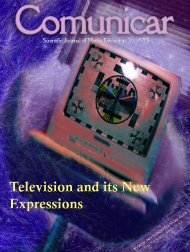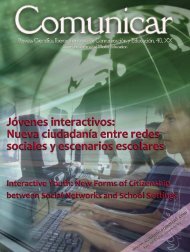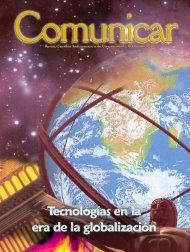Comunicar 39-ingles - Revista Comunicar
Comunicar 39-ingles - Revista Comunicar
Comunicar 39-ingles - Revista Comunicar
Create successful ePaper yourself
Turn your PDF publications into a flip-book with our unique Google optimized e-Paper software.
D O S S I E Rl Morella AlvaradoCaracas (Venezuela)Received: 10-12-2011 / Reviewed: 21-03-2011Accepted: 28-03-2012 / Published: 01-10-2012DOI: 10.<strong>39</strong>16/C<strong>39</strong>-2012-02-10Critical Reading of Media: AMethodological ProposalLectura crítica de medios: una propuesta metodológicaABSTRACTThis work analyzes some aspects on which the development of critical thinking is based starting with the contributionsof critical theory to the educommunicative perspective, as a bedrock for reflection on the media. This workreviews the characteristics of the critical subject and differentiates between critical reading and critical thinking. Theformer works as an analytic strategy that searches the re-reading of texts or audiovisual messages to identify categoriesattached to discussion and interpretation; the latter highlights ways to learn to think autonomously which leads to theproposal of interpretation strategies that target creative thinking. The objective of this article is to present orientationscoming from Social Communication as an academic discipline that sustain Critical Readings conceived as educommunicativestrategies. The methodology used to develop this study is the review of documents and content analysis.The result is a guide that proposes actions for critical media readings in the classroom. The conclusion is that thepromotion of a critical attitude involves identifying the political personality of the cultural industry and the communicationalprocess; it means constant questioning of the transparency of media messages, with the aim of creating independent,inquisitive and creative citizens.RESUMENEl presente trabajo analiza algunos aspectos sobre los que se sustenta el desarrollo del pensamiento crítico. Se partede los aportes que la Teoría Crítica brinda a la perspectiva educomunicativa, como base para la reflexión en tornoa los medios. Este trabajo se justifica en la medida en que se reflexiona sobre algunas dimensiones del sujeto crítico,y que diferencia entre lectura crítica y pensamiento crítico. La primera funciona como estrategia de tipo analítico quebusca la re-lectura de los textos o los mensajes audiovisuales, con el fin de identificar categorías sujetas a discusióne interpretación. El segundo apunta a una propuesta de aprender a pensar de manera autónoma, lo que conlleva elproponer estrategias de interpretación que apunten al pensamiento creativo. El objetivo del presente artículo es mostraralgunas orientaciones que, desde la comunicación social como disciplina, sustentan a las lecturas críticas concebidascomo estrategias educomunicativas. La metodología utilizada en este estudio es la revisión documental y el análisisde contenido. El resultado final es una guía en la que se proponen acciones para realizar lecturas críticas demedios en el aula. Se concluye que promover la actitud crítica, implica identificar el carácter político de la industriacultural y del proceso comunicacional; supone sospechar de la transparencia de los mensajes mediáticos y apunta aconformar un ciudadano independiente, cuestionador y creativo.KEYWORDS / PALABRAS CLAVEEducommunication, educational strategies, critical reading, critical perception, critical thought.Educomunicación, estrategias didácticas, lectura crítica, percepción crítica, pensamiento crítico.v Morella C. Alvarado-Miquilena is Assistant Professor and Researcher in the Institute of Communication Research(ININCO) of the Faculty of Humanities and Education at the Central University of Venezuela, Caracas (Venezuela)(profesora.morella@gmail.com).<strong>Comunicar</strong>, n. <strong>39</strong>, v. XX, 2012, Scientific Journal of Media Education; ISSN: 1134-3478; pages 101-108www.comunicarjournal.com



